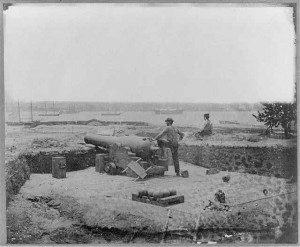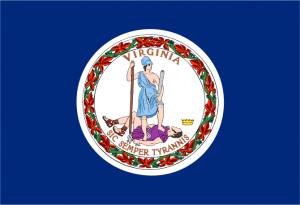OK, I admit it. When I read the title of this article my first thought was, “What are the rebels doing in Massachusetts?” That’s one advantage of being me – there’s always plenty of new stuff to learn. Gloucester Point is across from Yorktown on the York River in Virginia. From the Richmond Daily Dispatch July 26, 1861:
Correspondence of the Richmond Dispatch.
Affairs at Gloucester Point.
Gloucester Point, July 24th, 1861.
The fact that you have no “special correspondent” here should not lead the friends of Southern independence to suppose for a moment that we are doing nothing for the glorious cause. Under the supervision of Col. Crump, the Commandant of this post, and the laborious and pains-taking Captain Page, aided by a faithful corps of engineers, the works have been pushed forward vigorously; and to-day our boys, who are “spoiling for a fight,” would [hail] the approach of a Yankee float [?] with a perfect shout of pleasure. Our water battery is a perfect beauty. Huge Columbiads look defiance at the blockade, which manages to keep at a most respectful distance. As to the number of guns, we never tell [tales] out of school. They are manned by fine companies, and when the proper time comes they will give a good account of themselves.
Last week Capt. Page received two beautiful flags, presented to the battery by Misses Haxall, Daniel, and others, of Richmond, and at 12 o’clock on Saturday they were thrown out to the breeze by Col. Crump and the gallant Captain, while “Jeff, Davis” belched forth a shell that danced across the waters, and the assembled crowd gave three cheers and a “tiger.” The Captain then took his stand under the flag of Virginia, and read the letter accompanying this most acceptable present, together with his reply. Col. Crump followed with some stirring remarks. Should a Yankee ball ever cut down our flag- staff, there are boys enough here to plant it on the rampart in the name of the fair ones who gave it.
The news of the glorious victory at Manassas reached us Monday evening. Orders came at once from Capt. Page to “turn out.” In double-quick time we were at our guns, and eleven vigorous reports announced the interesting intelligence to our loving friends at Fort [Monroe], the blockade, &c. The battery on the York town side took up the chorus with a will.
Yesterday we tried our pieces on the breast-works, and were delighted with the experiment.
There was a heavy blow here Monday night, and the rain fell in torrents. The tide swept over the floors of some tents near the battery. The occupants put all their valuables on trunks and camp-stools, and taking their seats on them, smoked philosophic pipes, and watched the minnows as they darted through in terror. Our sentinels stood at their posts like men. I can understand how men raised as they have been submit so cheerfully to the hardships of a soldier’s life, only when I remember the cause that animates them.–Though they waded through water knee deep nearly all night, not one has been made sick by it, as far as I can learn. This looks like the special providence of God.
I wish I had room to inform our friends how kind the citizens of Gloucester are to us. –They have opened their heart and their houses, and seem willing to do anything for our comfort. Batter.
Colonels Charles A. Crump and Powhatan R. Page were field officers of the 26th Virginia Infantry, which fought at several venues during the war. By April, 1865 it had dwindled to 15 officers and 81 men. You can see a photo of Powhatan R. Page at VMI Archives.



